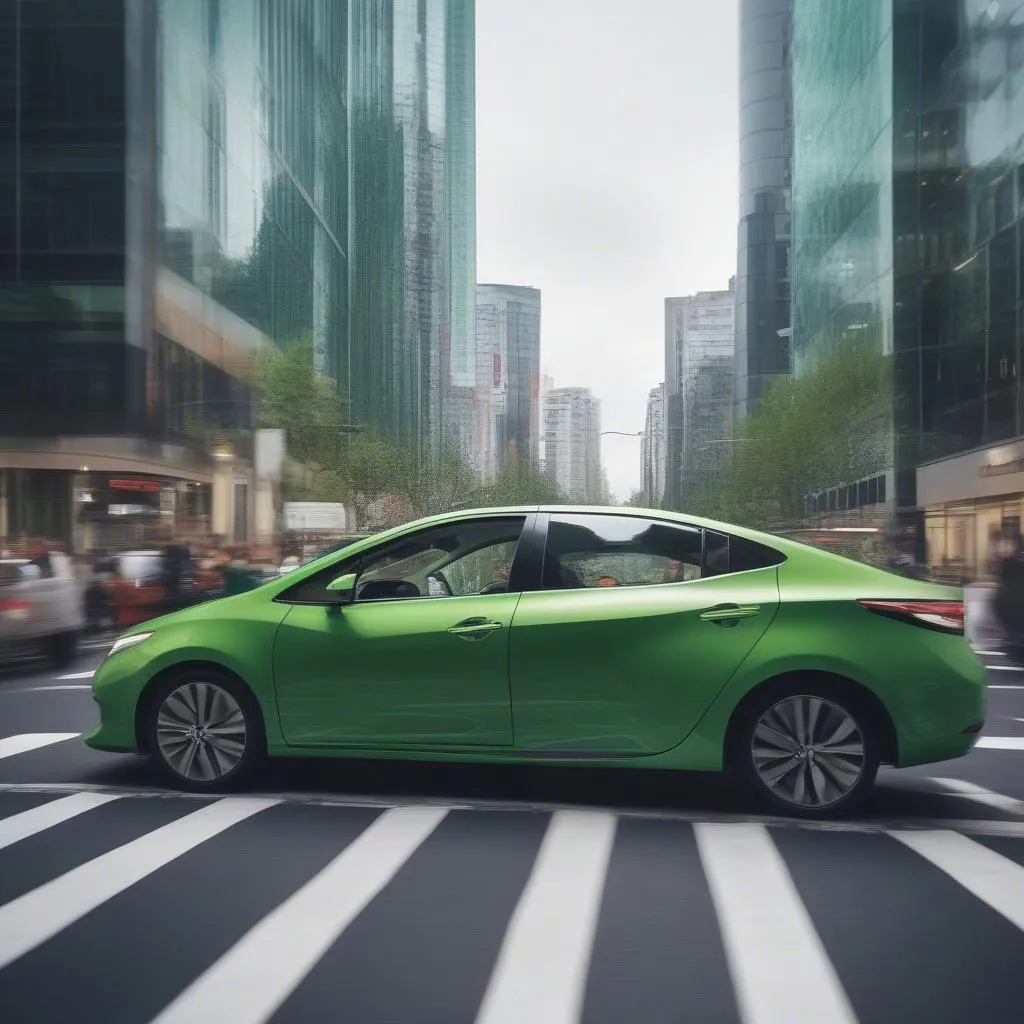Imagine this: you’re cruising down the highway, enjoying the open road, but instead of hearing the roar of a gas-guzzling engine, you’re listening to the gentle hum of an electric motor. No fumes, just fresh air and a clear conscience. This is the reality of “green cars” – vehicles designed to minimize their impact on the environment.
The Growing Importance of Green Cars: Why Eco-Friendly Matters
The term “green cars” encompasses a range of vehicles that use alternative fuel sources or technologies to reduce emissions and promote sustainability. The demand for eco-friendly transportation is skyrocketing due to rising concerns about climate change, air pollution, and the depletion of fossil fuels.
A Shifting Paradigm: Green Cars from a Mechanic’s Perspective
As a mechanic specializing in automotive electrical systems, especially those found in European vehicles, I see the rise of green cars as a significant change in the industry. Traditional gasoline and diesel engines are giving way to electric motors, sophisticated battery management systems, and complex hybrid technologies. This shift requires mechanics to adapt and stay ahead of the curve.
From a Technical Standpoint: The Mechanics Behind Eco-Friendly Driving
Here’s the breakdown of how green cars operate:
Electric Vehicles (EVs):
- These vehicles run entirely on electricity stored in rechargeable batteries.
- The electric motor drives the wheels, offering smooth acceleration and quiet operation.
- Charging stations are becoming increasingly common, making it easier to “refuel” EVs.
Hybrid Vehicles (HEVs):
- Combine a gasoline engine with an electric motor, offering a blend of fuel efficiency and performance.
- They use regenerative braking to capture energy during deceleration, charging the battery.
Plug-in Hybrid Vehicles (PHEVs):
- Similar to HEVs, but have larger batteries and can be plugged in for charging.
- Offer a longer range on electric power alone before transitioning to the gasoline engine.
Fuel Cell Vehicles (FCVs):
- Run on hydrogen fuel cells, converting hydrogen into electricity to power the motor.
- Emit only water vapor, making them exceptionally clean.
FAQs: Unveiling the Mysteries of Green Cars
What are the benefits of green cars?
- Reduced Emissions: Green cars emit significantly fewer pollutants than traditional vehicles, contributing to cleaner air and a healthier environment.
- Fuel Efficiency: EVs, HEVs, and PHEVs generally offer better fuel economy than gasoline or diesel vehicles, saving money on fuel costs.
- Quiet Operation: Electric motors run silently, reducing noise pollution and creating a more pleasant driving experience.
- Tax Incentives: Many countries offer tax breaks and subsidies for purchasing and using green cars.
What are the drawbacks of green cars?
- Limited Range: EVs and PHEVs have a limited range compared to gasoline vehicles, requiring frequent charging.
- Charging Infrastructure: Public charging stations are still limited in some areas, potentially hindering long-distance travel.
- Higher Initial Cost: Green cars can be more expensive to purchase than their gasoline counterparts.
- Battery Life: Batteries in electric vehicles eventually degrade and need to be replaced, which can be costly.
How do I maintain a green car?
- Regular Maintenance: Follow the manufacturer’s recommended maintenance schedule.
- Battery Care: Ensure your battery is properly charged and maintained.
- Fluid Checks: Check and replace fluids as needed.
- Tire Pressure: Maintain proper tire pressure for optimal fuel efficiency.
Is green car technology reliable?
- Green car technology has matured significantly in recent years, with reliable and advanced systems available.
- According to Dr. Emily Carter, author of “Sustainable Mobility: The Future of Transportation,” “The reliability of green car technology has drastically improved, and these vehicles are becoming increasingly robust and dependable.”
- However, it’s important to note that any vehicle can experience issues, and it’s always a good idea to have your green car serviced regularly.
Exploring Green Car Options: From EVs to FCVs
The market for green cars is diverse, offering a wide range of models to suit various needs and budgets. Here are some of the popular brands and models:
Electric Vehicles (EVs):
- Tesla Model 3, Model S, Model X (United States)
- Nissan Leaf (Japan)
- Chevrolet Bolt EV (United States)
- Volkswagen ID.4 (Germany)
Hybrid Vehicles (HEVs):
- Toyota Prius (Japan)
- Honda Insight (Japan)
- Hyundai Ioniq Hybrid (South Korea)
- Ford Fusion Hybrid (United States)
Plug-in Hybrid Vehicles (PHEVs):
- Toyota Prius Prime (Japan)
- Ford Escape PHEV (United States)
- Chevrolet Volt (United States)
- BMW i8 (Germany)
Fuel Cell Vehicles (FCVs):
- Toyota Mirai (Japan)
- Hyundai Nexo (South Korea)
Taking the Green Path: Your Journey Begins Now
The transition to green cars is a journey towards a sustainable future. By embracing eco-friendly transportation, we can reduce our dependence on fossil fuels, improve air quality, and make a positive impact on the environment.
 Green car in a city
Green car in a city
Don’t hesitate to contact our team of automotive experts at +84767531508 for any questions or concerns regarding green cars or automotive diagnostics. We are available 24/7 to assist you with any technical issues.
Ready to explore further? Check out these related articles:
- Hydrogen Powered Cars for Sale: https://diagxcar.com/hydrogen-powered-cars-for-sale/
- FCV Cars: https://diagxcar.com/fcev-cars/
This is just the beginning of your journey towards a greener future. Leave a comment below to share your thoughts on green cars or ask any questions you may have. Let’s drive towards a sustainable tomorrow!


